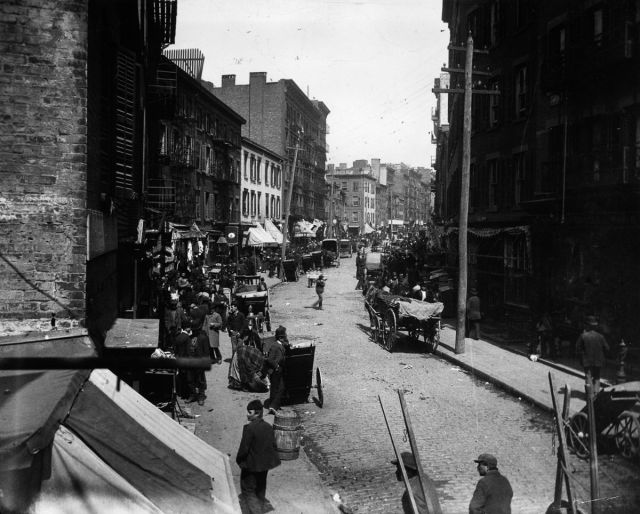
Mulberry Street -Little Italy -"
“Italians are just a little worse than the negro, being if anything, filthier in their habits , lawless and treacherous.”
John Parker, Governor of Louisiania
“Monday we dined at the Camerons; various dago diplomats were present, all much wrought up by the lynching of the Italians in New Orleans. Personally I think it rather a good thing, and said so.”
Theodore Roosevelt" - March 21, 1891 in a letter to Anna Roosevelt
“These sneaking and cowardly Sicilians, the descendants of bandits and assassins, who have transported to this country the lawless passions, the cut-throat practices, and the oath-bound societies of their native country, are to us a pest without mitigation. Our own rattlesnakes are as good citizens as they…Lynch law was the only course open to the people of New Orleans.“
“The New Orleans Affair”. Editorial in The New York Times. March 16, 1891. p. 4g
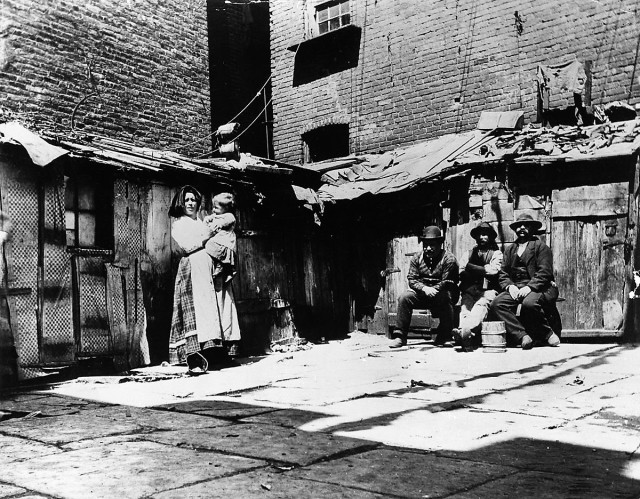
This week there was a mass murder, American style, in of all places Christchurch New Zealand committed by an Australian. Fifty Muslim worshippers were slaughtered at Friday prayers, all of the carnage posted live over Facebok. It was murder for the internet accompanied by a “manifesto” for trolls.
The “white supremacist” killer wasn’t concerned about saving New Zealand for white people; it was meant for others sitting in their basements in front of their computer screens. New Zealand, with a total population of maybe five million has perhaps 2,500 Muslim refugees. That’s like .0005%, Not exactly a threat.
No. The murders were meant to incite others to mass murder.
Here in America open hostility to immigrants has grown substantially since the election of our illustrious President. The situation at our southern border is a “National Emergency” as we are being “invaded” by “criminals, drug dealers, rapists and traffickers.” Most of the immgrants I see are grass cutters, roofers, tomato pickers or cleaning guest rooms in Vegas hotels - all jobs Americans won’t do at the wage levels they are paid.
But hostility against immigrants, the “other,” is as American as apple pie. Once upon a time, we Italians were the other” and I’m sure in certain enclaves out there, we still are.
“The majority of Italian immigrants arrived in waves in the early 20th century, many from agrarian backgrounds, and with a religion different than the Protestant majority. In the United States, and other English-speaking countries to which they immigrated, such as Canada and Australia, Italian immigrants were often viewed as perpetual foreigners, restricted to manual labor. As they often lacked formal education, and competed with earlier immigrants for lower-paying jobs and housing, there was inter-ethnic hostility.”
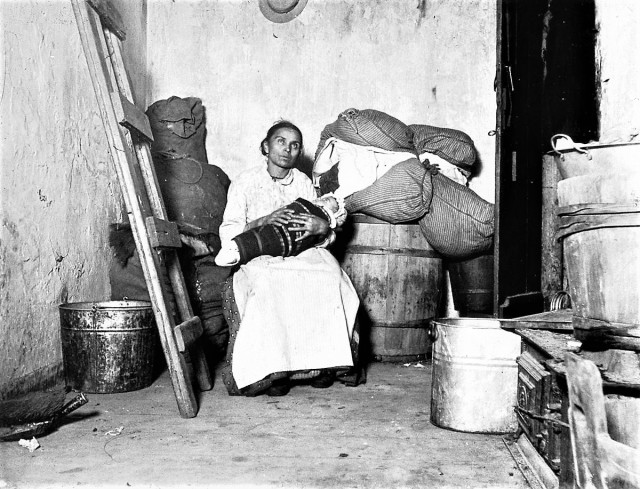
“An Italian immigrant rag-picker sits with her baby in a small run-down tenement room on Jersey Street”
Prior to 1880 there were few Italians in America. The waves that were to come (my grandparents arrived in 1906) aroused the anti-Catholic tradition that existed in the United States, inherited from Protestant/Catholic European wars over centuries. When the United States was founded, it inherited the anti-Catholic, anti-papal attitudes of its original Protestant settlers. Pilgrims weren’t exactly the most tolerant folk.
Some of the early 20th-century Italian immigrants brought with them a political disposition toward socialism and anarchism. Men like Arturo Giovannitti, Carlo Tresca, and Joe Ettor were in the forefront of organizing Italian and other immigrant laborers in demanding better working conditions and shorter working hours in the mining, textile, garment, construction and other industries. These efforts often resulted in strikes, which sometimes erupted into violence between the strikers, company goons and the police.
So what did solid genuine Americans think of us? You can see some of the comments above referring to the mass lynching of Sicilians in New Orleans.
One of the largest mass lynchings in American history was of eleven Italians in New Orleans, Louisiana, in 1891. The city had been the destination for numerous Italian immigrants.
Nineteen Italians who were “thought” to have assassinated police chief David Hennessy were arrested and held in the Parish Prison. Nine were tried, resulting in six acquittals and three mistrials.
The next day, a mob stormed the prison and killed eleven men, none of whom had been convicted, and some of whom had not been tried. Afterward, the police arrested hundreds of Italian immigrants, on the false pretext that they were all criminals.
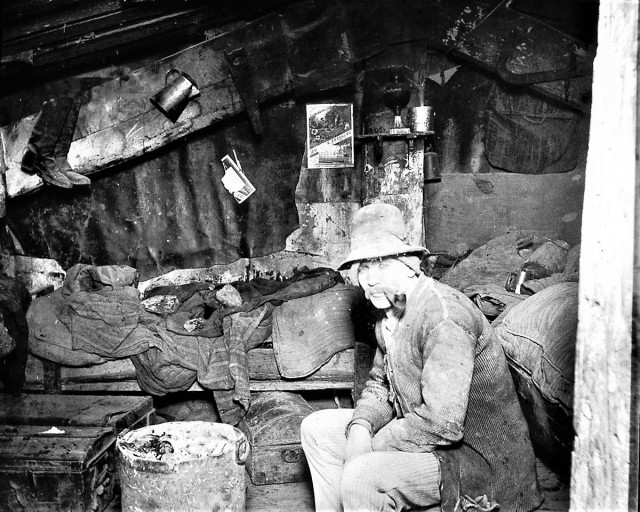
“An Italian immigrant man smokes a pipe in his makeshift home under the Rivington Street Dump.”
Teddy Roosevelt, not yet president, famously said the lynching was indeed “a rather good thing.” John M. Parker helped organize the lynch mob, and in 1911 was elected as governor of Louisiana. He described Italians as “just a little worse than the Negro, being if anything filthier in their habits, lawless, and treacherous.”
The New York Times in an editorial chimed in that the po folk of New Orleans had little choice but lynching.
In 1899, in Tallulah, Louisiana, three Italian-American shopkeepers were lynched because they had treated blacks in their shops the same as whites. A vigilante mob hanged five Italian Americans: the three shopkeepers and two bystanders.
I won’t bother going into Sacco and Vanzetti.
Anti-Italianism was part of the anti-immigrant, anti-Catholic ideology of the revived Ku Klux Klan (KKK) after 1915; the white supremacist and nativists targeted Italians and other foreign Roman Catholics, seeking to preserve the supposed dominance of Anglo-Saxon Protestants. During the early 20th century, the KKK became active in northern and midwestern cities, where social change had been rapid due to immigration and industrialization. It was not limited to the South. It wasat its strongest in Indiana, home of our Vice President.
It reached a peak of membership and influence in 1925. A hotbed of anti-Italian KKK activity developed in Southern New Jersey (of all places!) in the mid-1920s. In 1933, there was a mass protest against Italian immigrants in Vineland, New Jersey, where Italians made up 20% of the city population.
In response to the increasing nativist demands that the United States maintain its ethnic homogeneity Congress passed the Immigration Act of 1924, excluding all immigrants from Asia and setting a quota of 2% ot the ethnic population of the U.S as recorded in 1890 for all immigrants from outside the western hemisphere. As a result, populations poorly represented in 1890 were prevented from immigrating in numbers- especially affecting Italians, Jews, Greeks, Poles, and Slavs - while northern European protestants were favored.
Of course in the media we are always criminals, mob bosses or ignorant guidos. The entertainment media has stereotyped the Italian American community as tolerant of violent, sociopathic gangsters. Other stereotypes portray Italian Americans as overly aggressive and prone to violence. A study by the Italic Institute of America conducted between 1997 and 2001 revealed the extent of stereotyping in media. More than two-thirds of the 2,000 films assessed in the study portray Italian Americans in a negative light. Nearly 300 films featuring Italian Americans as mobsters have been produced since The Godfather (1972), an average of nine per year.
Yet according to recent FBI statistics, Italian-American organized crime members and associates number approximately 3,000. Given an Italian-American population estimated to be approximately 18 million, th. e study concludes that only one in 6,000 has any involvement with organized crime.
During the war many of us were interned; Joe DiMaggio’s father was banned from fishing or going anywhere near the California coast. He was such a danger to America. My paternal grandparents were registered as enemy aliens. Unlike the Japanese, no reparations were paid to Italians who were interned in camps.
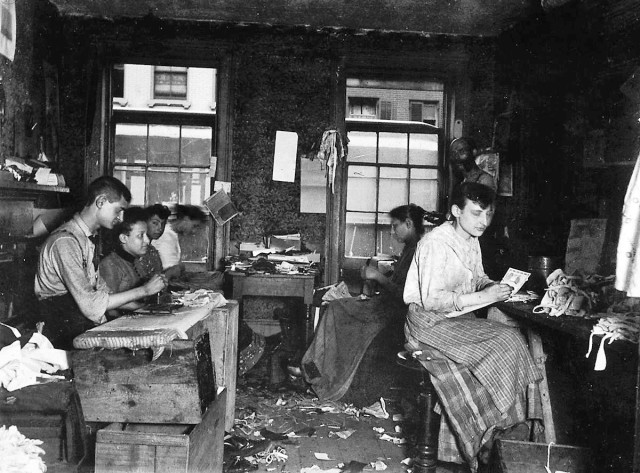
“Making neckties inside a tenement on Division Street in Little Italy.”
We were the criminals, the violent, lawless, and treacherous of 1900 who had to be kept out. Today 65% of Italian Americans are management, white collar or business owners. We had Mario Cuomo, Lee Iacocca and yes, Scalia and Alito. And Sinatra, Tony Bennett, Scorsese and DeNiro.
Today we have other “others.” Mexicans. Central Americans. Muslims. It is as American as apple pie. Judging from history, their children may speak both English and Spanish or Arabic. Their grandchildren will speak only English. Their children will be hyphenated Americans. Their grandchildren won’t. They will grow up totally American
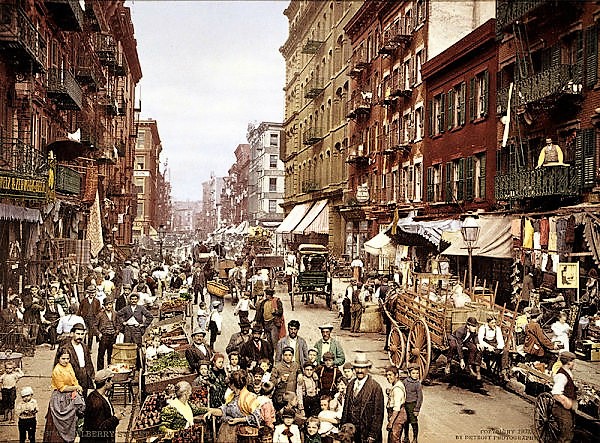
My grandparents spoke Italian and broken English. My parents spoke English and lousy Italian and only when they were saying something they didn’t want us kids to understand,
A son in law of mine is of direct Hispanic origin. He speaks not a word of Spanish though his parents speak it fluently. My wife’s mother wouldn’t pierce her daughter’s ears for earrings when she was a child; it was the mark of an Italian immigrant kid and my mother in law wanted her child to be an American kid. So no earrings. The girl I married forever wore clip-ons.
My Italian is terrible.
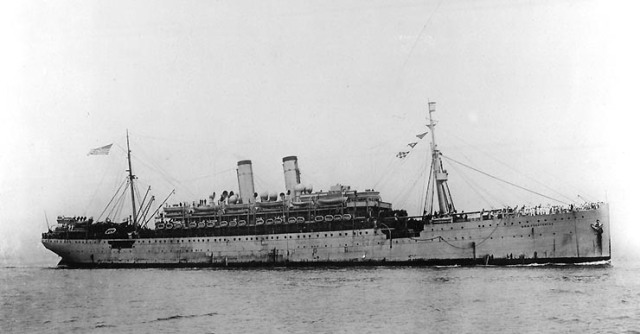
The “Prinzess Irene" - seized during WWI from German ownership by the navy and turned into the troop ship “Pocahontas” It was the ship on which my grandfather Francesco left Naples in 1906 with a wife and three children and never looked back.
And finally if my personal observations of my family, friends and neighbors is correct, the grandchildren of these new immigrants will be much less religious or non-religious than those who arrived. They will keep the best of their old country culture and ditch the rest.
So you see, we really aren’t going through anything new. People come here to build new lives for themselves and their children, who will grow up, serve in our military and contribute to what makes America “a shining city on a hill” as Ronald Reagan used to say.